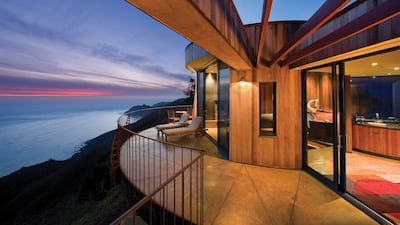When it comes to staying in luxury hotels, guests are often on the lookout for more value for money.
And these days, more can also come from less, as hotels and resorts look for ways to cut back on things like food and water waste, while maintaining five-star levels of accommodation and amenities.
Market gardens, water and waste recycling, on-site farms and bespoke disposal systems are merely some of the best practices employed at the most eco-conscious hotels in the world.
Here are eight of the best.
Bambu Indah, Bali

The brainchild of jewellery designers John and Cynthia Hardy, this ecologically minded jungle retreat in Bali uses all the natural resources the Indonesian island has.
The property, which is in the town of Ubud, has 10 bespoke rooms, each built using local materials, including plenty of bamboo. The restaurant serves Indonesian dishes using organic ingredients grown in the garden.
The team lives by an ethos of coming “full circle” in nature, which means the resort recycles waste and water, and works to reduce light pollution.
Organised activities include bike rides, hikes, village visits and bathing in the nearby waterfall.
Six Senses Zighy Bay, Oman

This resort on the Musandam Peninsula offers a mix of villas, suites and beachfront accommodations, without losing the village feel guests return for again and again.
The resort is by Six Senses, a hotel brand known for its approach to sustainability. The Zighy Bay property strives towards plastic-free and zero-waste goals, recycling 80 per cent of organic and glass waste on site.
Dishes are created using local ingredients, while the resort produces its own bottled water using reverse osmosis.
Staff also grow and produce vegetables, fruits, organic cheese and organic eggs on-site for the ultimate in farm-to-table dining.
Jetwing Kaduruketha, Sri Lanka

Jetwing Kaduruketha embraces the concept of “agro-tourism” among the paddy fields between the mountains of Wellawaya, south Sri Lanka.
Modelled after a traditional village, the property's rustic design is simple and uses innovative traditional architectural techniques, such as eschewing air conditioning for cooling rooms using bamboo walls and perforated doors.
Water is solar-heated and the kitchen stoves are fuelled by biogas generated on-site.
Heckfield Place, England
This Georgian home has been restored using traditional craftsmanship and local materials including English oak and mats handwoven from rushes harvested on the nearby River Ouse.
With six room types in the main house and a church lodge in the grounds, the house, set within 160 hectares of Hampshire countryside, is the first luxury hotel in the UK to achieve biodynamic status, meaning it embraces planting and harvesting using the biodynamic calendar. The calendar lets farmers utilise natural lunar, sun and soil cycles to benefit crop production.
Crops such as wheat and barley are grown on the land, which is also home to livestock including cattle, sheep and chickens.
The restaurant Marle, one of four on-site, holds a Green Michelin Star and allows diners to “experience the excitement and immediacy of food served straight from the earth”.
Song Saa Private Island, Cambodia

Private beaches, surrounding coral reefs and wooden villas made from local and upcycled materials combine sustainability and luxury in Cambodia.
At Song Saa Private Island, on the Koh Rong archipelago, guests choose between six different types of villas including ocean, overwater and jungle options. There's also a “spa with no walls” that offers sanctuaries across the island providing treatments that embrace the Buddhist tradition of metta bhavana – kindness and love.
The Song Saa Foundation helps care for and maintain the Koh Rong Marine National Park, monitoring and protecting coral reef and marine life, while the resort's irrigation and waste system allows for 100 per cent recycling.
Local fishermen keep the property's two restaurants well stocked, while fruits, vegetables and herbs are grown on-site.
The Post Ranch Inn, the US
This clifftop resort offers stunning views of California's Big Sur coastline from its 40 houses and suites.
The rooms are TV and alarm clock-free, to encourage guests to disconnect from routines and devices, and instead connect with nature.
It is designed using bio-structure architecture to harness natural resources for energy, while reclaimed wood and turf are used to insulate and maintain the properties.
Water is drawn from wells and there is 100 per cent recycling and composting, as well as a ban on single-use plastics.
There are also rare and endangered indigenous plants and species found on the land, so the ranch prioritises habitat protection and conservation.
Eremito Hotel, Italy

This boutique hotel in Umbria, Italy, offers guests a unique monastic approach to holidaying.
Situated in the village of Parrano, both the accommodation and the hotel’s ethos hark back hundreds of years with no phones, televisions or electrical appliances in the rooms, which are lit by candles in the evenings.
It is beside a Unesco Biosphere Reserve and here the ethos of “ancient luxury” melds perfectly with its sustainability goals.
Underfloor heating and cooling are utilised with electricity generated on-site using solar panels.
Rainwater provides irrigation for the gardens where organic produce is grown for the on-site vegetarian restaurant.
GoldenEye, Jamaica

When an area is as steeped in literary history as this one, it’s no wonder preservation is at the heart of everything the resort does.
GoldenEye is where British author Ian Fleming wrote all 14 of his James Bond books after purchasing two hectares in Jamaica’s Oracabessa Bay in 1946. He also built his home on the edge of a cliff overlooking a private beach.
As well as the original "Fleming Villa", guests can choose from an array of accommodations including beach and lagoon villas, lagoon cottages and beach huts.
Profits go back into the island to benefit the people of Jamaica via the GoldenEye Foundation, which has created a fish sanctuary, coral reef preservation and sea turtle project, all run by locals.
Food for the restaurants is sourced from nearby organic farms, with the foundation funding initiatives to expand agriculture in the region.

